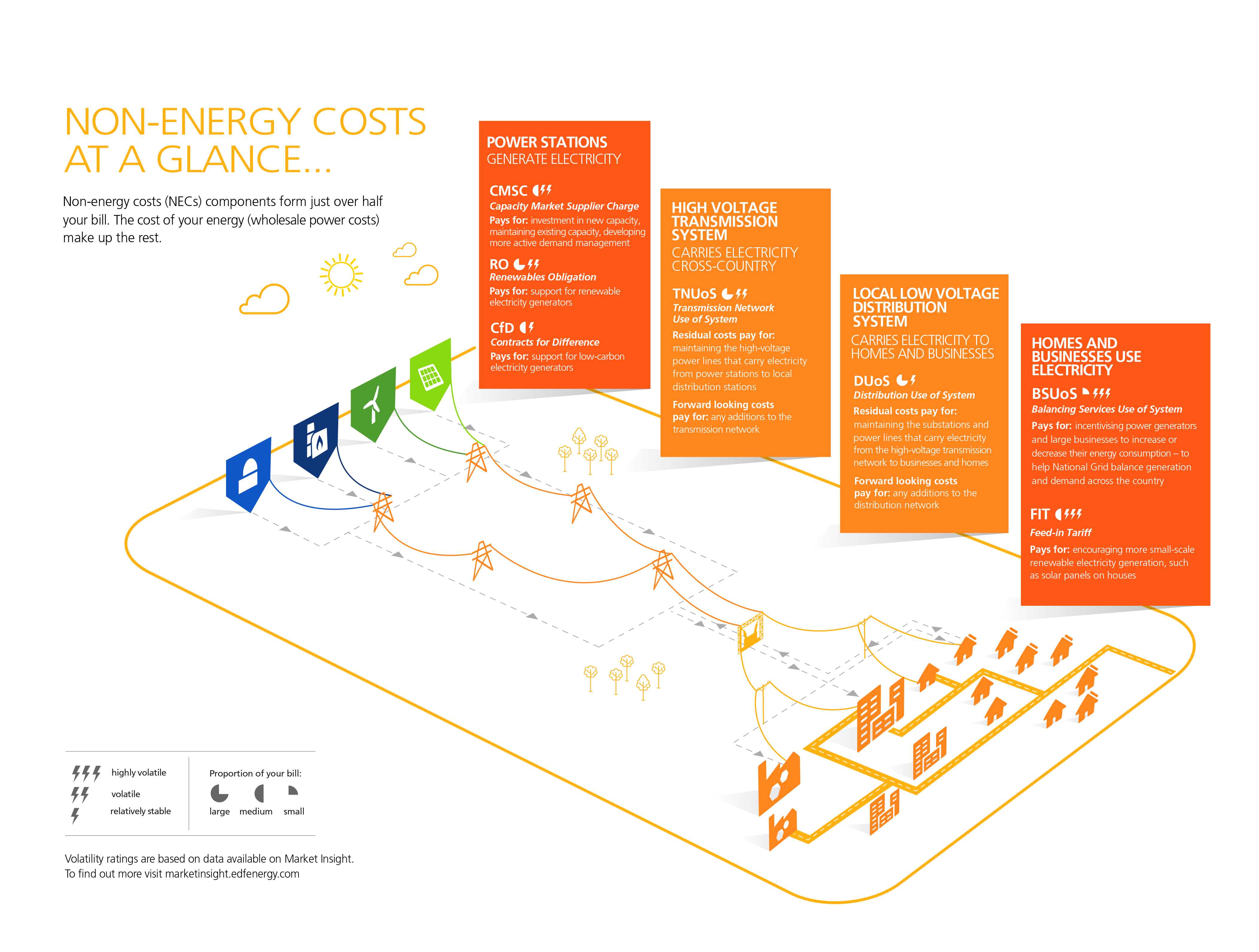Non-Energy Costs
NECs make up over 60% of your electricity costs but sit outside of EDF and Crown Commercial Service's control. In recent years these costs have been rising and becoming more difficult to predict. A change in any of these costs will impact your electricity invoice.
Understanding the three types of non-energy costs (NECs)
NECs make up over 60% of your electricity costs but sit outside of EDF and Crown Commercial Service's control. In recent years these costs have been rising and becoming more difficult to predict. A change in any of these costs will impact your electricity invoice.
Non-energy costs come in three forms:
- Delivery NECs are directly related to the delivery of electricity to your sites
- Electricity Industry NECs pay for the operation of the electricity industry
- Generation NECs support investment in future energy generation and capacity
Delivery NECs
Delivery based NECs are levied by the Transmission Network Operators and Distribution Network Operators. They vary depending on geographical location and the electricity consumption of your sites. If you're on an All Inclusive pricing point contract, then these delivery NECs will be incorporated into your unit rates. For CCS members on a pass-through price point, your invoice will show details of charges for all the following NECs except Tloss.

- Distribution Loss (Dloss) - These cover the electricity normally lost as heat in conductors and transformers as power runs through the distribution network. Each electrical supply is assigned a specific Dloss value, depending on its location in relation to local distribution network components.
- Distribution Use of System (DUoS) - These are costs charged by the local Distribution Network Operators. It covers transporting electricity from the transmission system, and some directly connected generators, to customers. For most Half Hourly supplies, DUoS costs are normally charged in three time bandings, representing peak, standard and off-peak consumption periods.
Learn how you can make changes to influence your DUoS charge
- Transmission Loss (Tloss) - These represent the electricity normally lost as heat in conductors and transformers as power runs through the transmission network.
- Transmission Network Use of System (TNUoS) - The costs charged by the transmission network companies. It covers transporting electricity across the transmission system to the distribution networks, directly connected generators and customers. For Half Hourly metered site only, TNUoS costs are calculated once a year, in a calculation based on your site's electricity consumption during three specific half hour periods in the winter, called Triad periods.
Electricity Industry NECs
These NECs cover the operation of the electricity industry. They ensure that the amount of electricity generated balances with demand, and that costs are allocated appropriately across the industry.
- Balancing Services Use of System (BSUoS) - BSUoS is a charge that allows National Grid to recover the money it spends on balancing the electricity system, which it needs to do in every half hour of the day. This maintains the quality and security of your electricity supply.
- Residual Cashflow Reallocation Cashflow (RCRC) - RCRC is a debit or credit to all suppliers and generators ensuring that the total imbalance charge, set out by the Balancing and Settlement Code (BSC), is zero across all parties.
- Assistance for Areas with High Electricity Distribution Costs (AAHEDC) - AAHEDC, previously referred to as the Hydro Levy, is a charge levied on all supply customers to subsidise the cost of distributing electricity in the sparsely populated area of Northern Scotland.
- Elexon - This covers Elexon's costs for administering the wholesale electricity balancing and settlement arrangements and the associated documentation to comply with the Balancing and Settlement Code (BSC) for Great Britain.

Generation NECs
This group of NECs are levies on electricity consumers designed by Governement to support and promote the growth of future energy generation, such as low carbon energy generation technologies.

- Renewables Obligation (RO) - A charge for supporting renewable electricity generation projects in the UK, such as wind farms. This charge subsidies RO scheme registered renewable electricity projects, which rely on this support in order to be competitive with other electricity generation technologies.
- Contracts for Difference (CFD) - Similarly as for the RO, this charge provides support to low-carbon electricity generators. This scheme is replacing the RO for newly registering generators, generators already registered with the RO will continue to be supported by that scheme. The CFD scheme better encourages competition between generators and so is expected to offer better value for money to consumers than does the RO.
- Feed in Tariff scheme (FITs) - Is a programme designed to promote the uptake of small-scale, typically domestically owned, renewable electricity generation technologies. All electricity supply companies are obligated to share the cost of supporting these generators. The supplier costs are then recovered from consumers through this charge.
- Capacity Market (CM) - this provides a regular retainer payment to reliable forms of capacity (both demand and supply side), in return for such capacity being available when the system is tight.

What has impacted my prices this year?
To help CCS members, we update our ‘Your New Prices Explained’ guide at each April renewal and run a Talk Power webinar to talk you through:
- What influences your prices
- Walk through the "Your Prices Explained" document
- and where to find continued support
Monitor report - Get our expert's view
At EDF, our team keep watch over a wide range of factors that influence each non-energy cost, ranging from policy signals of government and Ofgem through to the latest view of electricity demand. Keeping on top of all these different factors helps us arrive at our best view of each non–energy cost, assisting you in setting your energy budget with confidence.

